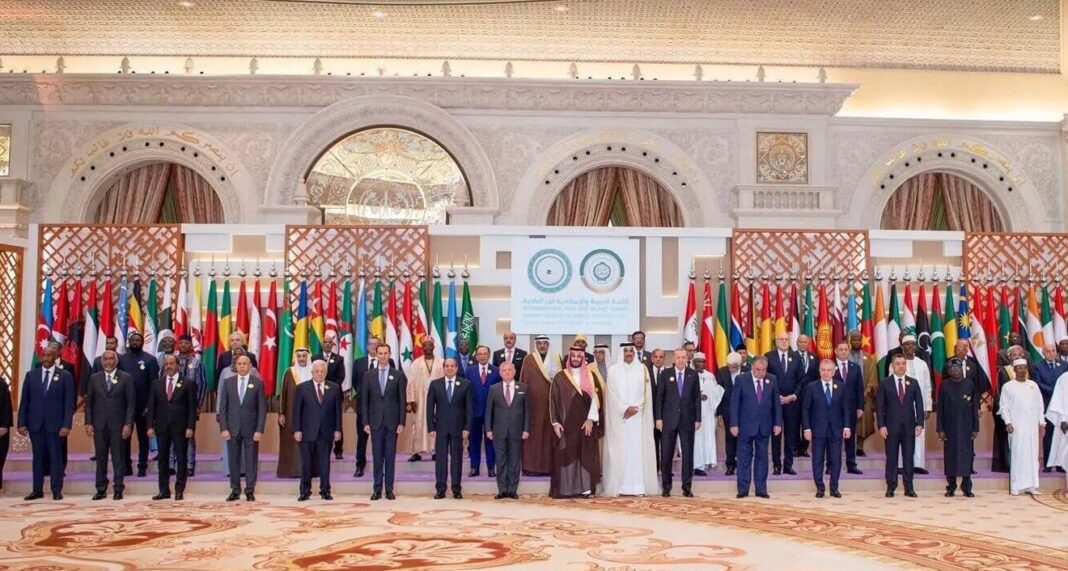Turkish President Recep Tayyip Erdoğan, whose efforts at normalizing relations with Syrian President Bashar al-Assad have so far failed, said he is still hopeful about mending ties with the Syrian leader, the state-run Anadolu news agency reported.
Erdoğan made the comment on Wednesday to reporters accompanying him during a return flight from his recent trip to Saudi Arabia and Azerbaijan.
Erdoğan attended the Joint Arab-Islamic Extraordinary Summit held in Riyadh on Monday, which featured leaders and heads of government as well as heads of delegations of the member states of the Organization of Islamic Cooperation and the League of Arab States.
Assad, who was also among the participants at the summit, was seen in a photo with Erdoğan for the first time in several years. Though the leaders were once close friends, there was no personal encounter during the event.
Turkey and Syria severed diplomatic relations in 2011 after the outbreak of the Syrian war, but Erdoğan, who then supported rebel efforts to topple President Assad, has sought rapprochement with Damascus in recent months.
When asked whether he had a chance to speak to Assad during the summit in Riyadh, Erdoğan dodged the question, saying he couldn’t listen to a speech Assad gave because he had to leave the summit hall for a personal meeting with Saudi Crown Prince Mohammed bin Salman.
“I am still hopeful about [normalization with] Assad. I still hope to meet with him and put Turkish-Syrian relations back on track,” Erdoğan told reporters.
He added that normalization of relations between Turkey and Syria will contribute to peace on Syrian soil and that Turkey poses no threat to Syria’s territorial integrity.
Erdoğan accused Kurdish militant groups, such as the outlawed Kurdistan Workers’ Party (PKK) and the main Syrian Kurdish militia, the People’s Protection Units (YPG) and its political arm, the Democratic Union Party (PYD), of threatening Syria’s territorial integrity.
The YPG and the PYD are seen as terrorist groups by Turkey and an offshoot of the PKK, classified as a terrorist organization by Turkey and several of its Western allies.
“Assad should be aware of this and take the steps necessary to start a new era in his country; he should stand up for his country,” said Erdoğan, while warning the Syrian government to take the “threat” posed by Israel,which has been waging wars in Palestinian enclave of Gaza and Lebanon, seriously.
The recent conflict in Gaza and Lebanon has exacerbated fears that fighting might escalate to the broader region.
Turkey originally aimed to topple Assad’s regime when the Syrian civil war erupted with the violent suppression of peaceful protesters in 2011, backing rebels calling for his ouster. More recently, Ankara has shifted focus to preventing what Erdoğan in 2019 called a “terror corridor” from opening up in northern Syria.
Turkish forces and Turkey-backed rebel factions control swaths of northern Syria and Turkey has taken in 3.2 million refugees from the war-torn country, according to UN data.
Assad has approached Erdoğan’s efforts at normalization cautiously. In a July interview, he said he was open to meeting with Erdoğan but that it depended on the “content” of the encounter, noting that Turkey’s presence in Syria is a key sticking point.
Assad hinted that a halt of Turkey’s “support” for terrorism in Syria and its withdrawal from Syrian territory would be “reference points” for a meeting with Erdoğan.
Syria accuses Turkey of supporting “terrorism” due to its backing of opposition groups in the country.


